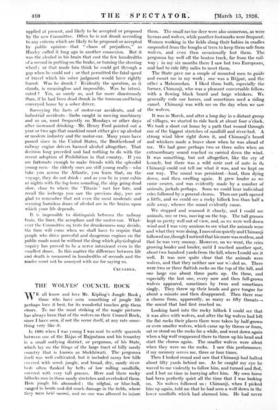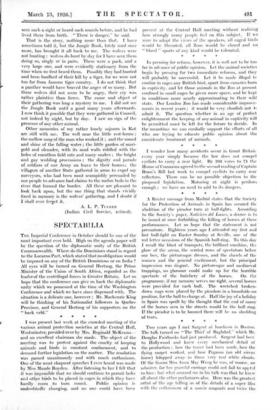TILE WOLVES' COUNCIL ROCK
ivall know and love Mr. Kipling's Jungle Book ; those who have seen something of jungle life perhaps love it best, for its wonderful touches grip them closer. To me the most striking of the magic pictures has always been that of the wolves on their Council Rock, since I have seen, if not the scene itself, at any rate some- thing very like it.
In 1889 when I was young I was sent to settle quarrels between one of the Rajas of Rajputana and his tenantry in a small outlying district, or pergunna, of his State, which lay on the fringe of the large. tract of hilly sandy country that is known as Shekhawati. The pergunna itself was well cultivated, but it included many low hills covered with scrub jungle, and broad, dry, sandy river- beds often flanked by belts of low rolling sandhills; covered with very tall grasses. Here and there rocky hillocks rose in these sandy stretches and overlooked them. Here jungle life abounded ; the nilghai, or blue-bull, ranged in herds and did much damage in the fields, where. they were held sacred, and no one was allowed to injure. them. The small ravine deer were also numerous, as were hyenas and wolves, while panther footmarks were frequent: Women working in the fields slung their babies in cradles suspended from the boughs of trees to keep them safe from wolves, and even then occasionally lost them. The pergunna lay well off the beaten track, far from the rail- way ; in my six months there I saw but two Europeans, and had to ride fifty miles to meet them.
The State gave me a couple of mounted men to guide and escort me in my work ; one was a Rajput, and the other a Mahomedan. I liked them both, especially the former, Chimanji, who was a pleasant conversable fellow, with a flowing black beard and large whiskers. We generally rode our horses, and sometimes used a riding camel. Chimanji was with me on the day when we saw the wolves.
It was in March, and after a long day in a distant group of villages, we started to ride back at about four o'clock.
We took a short cut home by a path that wound through one of the biggest stretches of sandhill and river-bed. - A strong wind blew right down it, and Chimanji's beard and whiskers made a brave show when he was ahead of me. We had gone perhaps two or three miles when an extraordinary sound reached us carried down the wind.
It was something,' but not altogether, like -the cry of hounds, but there was a wild eerie sort of note in it Chimanji could not tell me what it was, and we kept on our way. The sound was persistent—loud, then dying down, and then swelling again. It grew louder as we came nearer, and was evidently made by a number of animals, jackals perhaps. Soon we could hear individual cries followed by a general chorus. Then our path opened a little, and we could see a rocky hillock less than half a mile away, .whence the sound evidently came.
We stopped and scanned it closely, and I could sec animals, one or two,. moving on the top. The tall grasses kept us pretty well out of view, and, as we were well down wind and I was very anxious.to see what.the animals were and what they were doing, I moved on quietly and Chimanji followed me,though I noticed that his mare was restless, and that he was very_ uneasy. However, on we went, the cries, growing louder and louder, until I reached, another spot,.
about two hundred yards from the hill, where Icould see. it well. It was now quite clear that the animals were wolves, and.that they neither saw nor w!-!-Aled us. There were two or three flattish rocks on the top of the hill, and one large one about three parts up. On these, and especially the last one, _every now and then full-grown wolves appeared, sometimes by twos and sometimes singly. They threw up their _heads and gave tongue for about a minute and then disappeared. Then there rose a chorus from, apparently, as many as fifty throats—. the sound that had first reached us.
Looking hard- into the rocky hillock I could see that it was alive with wolves, and after the big wolves had left the flat rocks their places there were taken by half-grown or even smaller wolves, which came up by threes or fours, sat or stood on the rocks for a while, and went down again when a big wolf reappeared there to throw up his head and start the chorus again. The smaller wolves were silent when they were on the rocks. I saw this performance,- if my memory serves me, three or four times.
Then I looked round and saw that Chimanji had halted about fifty yards behind me. As he caught my eye he waved to me violently to follow him, and turned and fled, and I lost no time in hurrying after him. My own horse had been perfectly quiet all the time that I was- looking on. No wolves followed us ; Chimanji, when I picked him up again, told me that he had seen a wolf down in the lower sandhills which had alarmed him. He had never seen such a sight or heard such sounds before,. and he had lived there from birth. " There is danger," he said.
That is the, story, _nothing more than that. I hat=e sometimes told it, but the Jungle Book, lately read once more, has brought it all back to me. The wolves were not hunting ; wolves do hunt by day for I have seen them doing so, singly or in pairs. These were a pack, and a very large one, and were evidently stationary from the time when we first heard them. Possibly they had hunted and been baulked of their kill by a tiger, for we were not too far from famous tiger country. I do not think that a panther would have braved the anger of so many. But these wolves did not seem to be angry, their cry was rather plaintive than fierce. The cause and object of their gathering was long a mystery to me. I did not see the Jungle Book until a good many years afterwards. I now think it possible that they were gathered in Council, not indeed by night, but by day. I saw no sign of the presence of any other animal.
Other memories of my rather lonely sojourn in Kot are .still with me. The well near the little rest-house ; the mellow song, of the man who worked it ; and the sound and shine of the falling water ; the little garden of mari- gold and oleander,. with its mud walls riddled with the holes of countless field rats and many snakes ; the bright and gay wedding processions ; the dignity and parade of, soldiers . of our, Army on leave to their. homes ;. the villagers of- another State. gathered in arms to expel my surveyors, who had been most scampishly persuaded by our people to advance. bad claims to the melon beds in the river. that formed the border. All ,these are pleasant to look back _upon, but the one thing that stands vividly fixed in memory is. the wolves' gathering, and I doubt if I shall ever forget it: _ A. L. P. TUCKER (Indian Civil Service, retired).































































 Previous page
Previous page